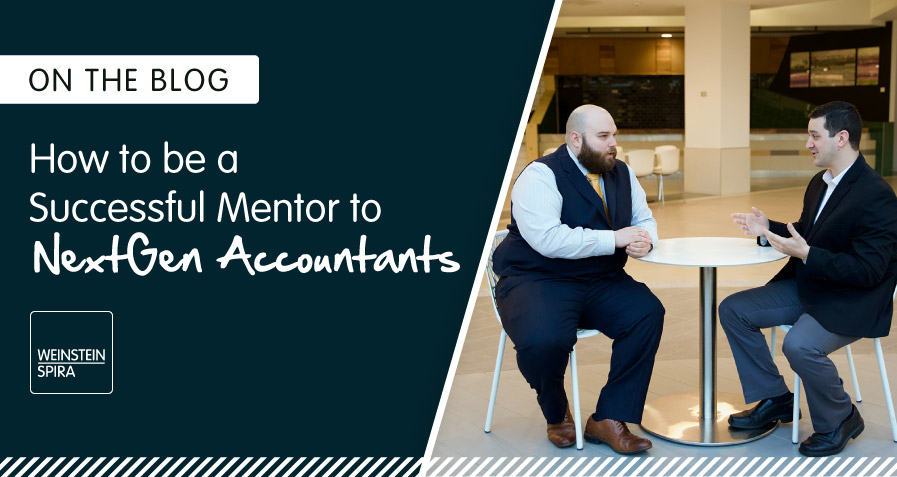What is a NextGen Mentor?
In this context, a NextGen mentor is someone who coaches an employee in the accounting profession, where the person coached has less than five years of experience. Whether you are mentoring Generation X, Y, or Z…being an early career coach is a chance to help people thrive in the first job of their chosen field. The more successful a mentor is in their role, the more successful the mentee can be, now and in the future.
How it Works
Every mentee is different, so the mentor’s approach should be tailored to meet each person’s specific needs and communication style. A lot of what a NexGen mentor does is help new accountants navigate work-related issues that commonly come up in the first year or two, such as human resource issues, company policies, sitting for the CPA exam and interpersonal relationships in the office or at a client site.
At our firm, HR decides who will mentor whom. We call them coaches and coachees. Generally, managers are assigned to mentor staff and senior-level employees. Once an employee is promoted to supervisor or manager, however, they are generally reassigned to a shareholder, who can better guide and assist them towards becoming a member of the firm’s management. Ideally, it is also helpful to be coached by a mentor in the same discipline, either audit or tax.
Tips for NextGen Mentors
From Day 1, remember that everyone is trying to do a good job, to grow, to get promoted, and to be successful. It is the job of the mentor to help make that happen. Below are some tips to be the best mentor you can be:
Get connected
First, establish a relationship with your new mentee by sharing background information (back and forth) to get to know each other. This can include personal and professional facts about family, upbringing, school, reason for going into accounting, which area of accounting is of most interest (tax versus audit, or both), etc.
Create a comfort zone
It is up to mentors to ensure the space is safe and trust is built, so that the mentee is comfortable in sharing thoughts, ideas, and feelings. Sometimes, personal issues impact the workday or extend over a period of time and need to be discussed openly and honestly.
Be enthusiastic
Make sure you are in the proper frame of mind whenever you meet and have a conversation with your mentee. If you are enthusiastic, cheerful, and optimistic, you will approach the conversation in a positive manner that is non-threatening and non-judgmental.
Be understanding
It is important to be understanding and always uplifting, even if delivering disappointing news. This nurturing/empathetic part of your role may need to be developed (perhaps with help from your own coach) if it is not already one of your strong suits.
Set goals
Goal setting is an important part of being a mentor. Use the initial meetings with your mentee to set at least three goals, and then periodically go over them, modifying as needed to reflect short- and long-term objectives. Goals need to be very specific and can address soft skills and technical skills, alike. It is preferable that they be actionable and measurable, with a due date, so your mentee knows what is expected and by when.
Review performance
At Weinstein Spira, performance reviews are conducted twice a year. It is up to the mentor to deliver the results of such reviews. It is an ideal time to check in and see how your mentee’s career is progressing, whether or not goals are being met, and making sure they are on track to achieve those goals.
Discuss promotion
Too often, employees are hesitant to self-promote, i.e. openly talk about wanting to be promoted. Within the mentor-mentee relationship, you can bring this up as a question to start the conversation. Some may not want to go there; but if they do, let them know if you think they are ready for the next level. If they need to first master more skills, let them know that, as well, with suggestions about steps to take and even exercises that you can do together. This is where an encouraging attitude really comes into play!
Have fun
Remember, just because you are in the mentor-mentee mode, it does not always have to be serious. It is okay to joke around, laugh, and enjoy each other’s company. That might include having coffee via video conference or having an occasional informal lunch to reinforce bonding.
Summary
Nothing about mentoring is set in stone, except for the fact that it should always center around the mentee, their needs, and their goals. The above tips are meant as best practices, with the caveat that you will develop your own mentoring style that evolves over time. And if for some reason, a particular mentor-mentee match does not turn out to be a good fit, there are avenues to go through HR for re-assignment, without anyone feeling at fault.
If you come from a positive place and foster the mentee’s career, you will be doing a great service. NextGen accounting mentees (or any mentees, for that matter) will appreciate it!



